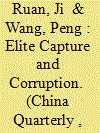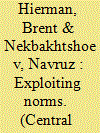| Srl | Item |
| 1 |
ID:
190408


|
|
|
|
|
| Summary/Abstract |
This article presents a qualitative empirical study of elite collusion and its influence on village elections and rural land development in China. Drawing on ethnographic data collected from two Chinese villages, it investigates how village cadres collude with other rural elites, using bribery, gift-giving and lavish banquets, to establish reciprocal ties with township officials and other public officials. Meanwhile, the officials make use of formal organizations to corruptly obtain profits and form alliances with village elites. The article examines how rural elites, especially village cadres, use this collusion to profit from the misuse of villagers’ collectively owned assets, the manipulation of village elections and the suppression of anti-corruption protests. It also offers new descriptive evidence of how recent reforms designed to strengthen the Party's overall leadership in rural governance may have actually facilitated elite capture and grassroots corruption.
|
|
|
|
|
|
|
|
|
|
|
|
|
|
|
|
| 2 |
ID:
178468


|
|
|
|
|
| Summary/Abstract |
This article advances a straightforward argument: a complete analysis of land reform processes in Central Asia needs to account for gender dynamics. More explicitly, it argues that alongside the feminization of agriculture, customary gender norms restricting female economic opportunities and property acquisition represent a structural advantage for local elites interested in hindering or delaying the process of farm individualization in Tajikistan. After overviewing the gap between female legal rights to agricultural land and the actualization of these rights in four Central Asian states (Kazakhstan, Kyrgyzstan Tajikistan and Uzbekistan) the article narrows its focus to Tajikistan. After regression analyses reveal that gendered information gaps are insufficient to account for gaps in the registration of farmland, the study presents qualitative data examining the relationship between female-headed households and the slow pace of agrarian change in Tajikistan.
|
|
|
|
|
|
|
|
|
|
|
|
|
|
|
|
| 3 |
ID:
133117


|
|
|
|
|
| Publication |
2014.
|
| Summary/Abstract |
The dramatic expansion of large-scale economic land concessions and acquisitions in the Global South has generated considerable concern amongst activists, journalists and academics recently. This has led to the increased prevalence of the term 'global land grabbing', which I argue represents a particular type of meta-narrative. In this article the global land grab meta-narrative is considered in relation to recent land alienation of Indigenous Peoples in the northeastern Cambodia province of Ratanakiri. While land grabbing is certainly a crucial problem, it is insufficient to explain the circumstances in Ratanakiri or in Cambodia more generally as 'global land grabbing'. While foreign capital is associated with land grabbing in Cambodia, there are various other factors that also require consideration. Specifically, the role of Asian money laundering and elite capture requires increased attention. This article contributes to better understanding the particular ways that land dispossession plays out in particular places and contexts.
|
|
|
|
|
|
|
|
|
|
|
|
|
|
|
|
| 4 |
ID:
190746


|
|
|
|
|
| Summary/Abstract |
The article critically examines the presence of political and bureaucratic capture in public sector resource allocation in the province of Balochistan, Pakistan. The article applies robust empirical techniques to evaluate how the political and bureaucratic elite indiscriminately and disproportionally allocate public sector funds to meet two overarching ends: (a) to allow maximum misappropriation of public funds for their benefits and (b) to make constituency/district-specific allocations to buy political allegiance and promote pork barrel and patronage politics (political clientelism). For the empirical purpose, the article uses an unbalanced panel technique using data for districts from provincial-level sources. The empirical results show a strong capture and clientelism in the process of budget making and the allocations of resources/projects to districts/constituencies for incumbent politicians and senior career officials who are at the helm of affairs, making disproportionate budgetary allocations of public resources to their home districts or constituencies or the projects with much leverage of extraction (read bribes) in the process of project allocations, bidding and execution. The evidence suggests that districts, which are neither represented by the incumbency of provincial government nor by senior bureaucrats in ministries that make public policy, receive far lesser budgetary allocations than their proportionate share despite the prevailing poor social and economic landscape. Such capture suffices personal interests, supports clientelism in resource sharing and creates an inter-regional and inter-district/constituency disparity in terms of economic and social development within the province.
|
|
|
|
|
|
|
|
|
|
|
|
|
|
|
|